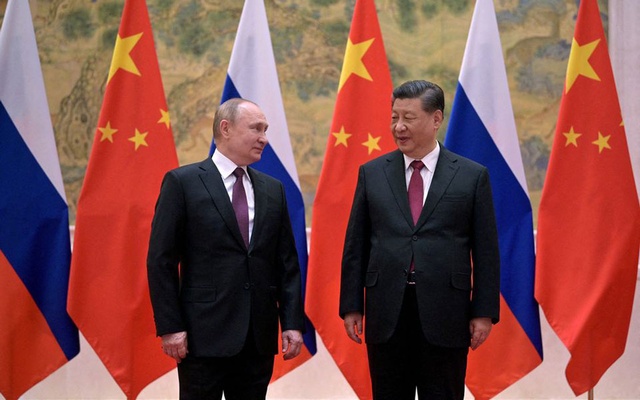Even as Russian soldiers continue to shell Ukrainian cities, government officials in China have been gathering behind closed doors to discuss a Communist Party-produced video that extols Russian President Vladimir V. Putin as a national hero.
According to the film, the humiliating fall of the Soviet Union was the consequence of attempts by the United States to undermine the legitimacy of the Soviet Union. Mr. Putin is praised in the documentary for rehabilitating Stalin’s status as a great wartime commander, as well as for reinvigorating Russian patriotic pride in the country’s history, which is set to rousing music and bright vistas of modern-day Moscow.
China presents itself to the rest of the world as a principled observer of the conflict in Ukraine, refusing to take sides and merely seeking peace. Chinese Communist Party officials are promoting a campaign at home in which Russia is shown as a long-suffering victim rather than an aggressor, and in which China’s close connections with Moscow are seen as essential.
Universities in China have set up programmes to provide students with a “proper knowledge” of the conflict, with many of the sessions focusing on Russia’s complaints against the West. Party newspapers have published a series of commentary in which the United States is held responsible for the crisis.
Although Chinese authorities have long cited the demise of the Soviet Union as a warning, President Xi Jinping has given the story a more urgent and deadly twist. He has done so by welcoming Mr. Putin as a fellow authoritarian aligned against Western supremacy, proving to the Chinese people that Mr. Xi has a partner in his fight against Western imperialism and hegemony.
In light of reports of Russian forces shooting individuals in the head and tying their wrists behind their back before they were murdered, it is uncertain if China would change its backing for the Russian invasion despite the charges.
However, China has so far refrained from criticising Mr. Putin for the conflict, which has resulted in the deaths of thousands of people. Despite calls from other global leaders for Beijing to utilise its influence over Moscow to help bring the situation to a close, the Chinese government has done nothing more than call for peace. In addition, during meetings with his Russian counterpart, Sergey Lavrov, on Thursday in Beijing, China’s foreign minister, Wang Yi, emphasised his country’s commitment to solid relations with Moscow.
Reports on local government websites say the documentary, titled “Historical Nihilism and the Soviet Collapse,” has been the centrepiece of a months-long campaign aimed at party officials that has been ongoing since Russia launched its full-scale invasion of Ukraine on February 24, according to the reports. Official statements announcing the screenings often refer to officials handling the exams as urging cadres to retain steadfast commitment to Mr. Xi.
Since the Soviet Union’s dissolution in 1991, Chinese politicians have been arguing the reasons for the collapse of the Soviet Union. Mr. Xi, more than any of his predecessors, has attributed the Soviet Union’s disintegration to a lack of ideological spine as well as Western political infiltration.
The study effort is intended to inspire loyalty among cadres ahead of a Chinese Communist Party meeting later this year, at which Mr. Xi is expected to seek a third term in office as president.
Political allegiance has become more important to Mr. Xi as Beijing attempts to curb Covid breakouts via rigorous lockdowns and manage a faltering economy at the same time. China’s foreign policy has come under criticism after several Chinese academics published articles in which they criticised Beijing’s failure to denounce Russian President Vladimir Putin.
The party has worked harder to defend its position in recent weeks, and several of the critical writings have been removed off the website as a result. Editorialist pieces in Communist Party journals have bolstered the Chinese leadership’s claim that the United States and NATO are the actual culprits in Ukraine, since they are damaging Russian national security.
The organisation of indoctrination lectures for students suggests that authorities are concerned about young, educated Chinese who may be sensitive to allegations that Beijing has been too accommodating toward Mr. Putin, as has been suggested.
According to an online account of the lecture, Liu Zuokui, a researcher from the Chinese Academy of Social Sciences, told an audience of college students in eastern China that the conflict began as a result of “NATO’s eastward expansion, which constricted Russia’s space for existence.”
An additional speaker told a group of scientists in Beijing that China needed to safeguard its strategic alliance with Russia against “strong shocks and repercussions.”
The party’s insistence on uniformity in the face of the crisis will make it more difficult for any opposition to coalesce into a coordinated campaign against Mr. Xi.
When it comes to Chinese officials, Mr. Johnson, the former C.I.A. analyst, believes that they have a “either we hang together or we hang separately” mindset. The question is, “If it is a strong nationalist attitude, who in the party doesn’t want to be a good nationalist?”

